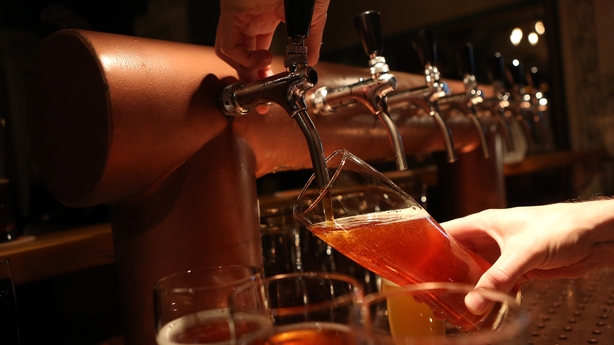The number of Irish breweries producing their own product has more than quadrupled since 2012, a new report from the Drinks Industry Group of Ireland (DIGI) shows.
The increase from 15 to 72 has led to a total rise in microbrewery turnover from €8m in 2012 to €52m in 2016.
Today's report reveals that 14% of the country's breweries are located in Cork, followed by 10% in Dublin, and 7% in each of the counties of Galway, Wicklow and Donegal.
It noted that every county in the Republic, apart from Westmeath, has at least one brewery.
DIGI's Innovation and Entrepreneurship in the Drinks Industry report was authored by DCU economist Anthony Foley.
DIGI said that brewers, distillers, cider producers, pubs, restaurants, hotels and off-licences are supporting and growing economic activity in Ireland and that activity is spread widely across the country.
It also said that the Irish drinks industry is the country's fastest-growing manufacturing industry in terms of number of enterprises.
While the number of enterprises in the overall manufacturing sector has increased by less than 1% since 2008, DIGI said the number of drinks industry enterprises has grown by 105%t.
It also said that the number of enterprises in the second fastest-growing manufacturing industry, food, has grown by 28% in the same period.
Today's report shows that the Irish drinks sector is experiencing growth across the beer, cider and spirit categories.
In 2013, there were just four working whiskey distilleries in Ireland. By 2017 there were 18, and there are plans for another 16.
Ireland's gin sector, too, is attracting worldwide interest and plans to treble its exports to 400,000 9-litre cases by 2022.
It also noted that the number of licences granted for cider production increased from three in 2009 to 18 in 2017.
Donall O’Keeffe, Secretary of DIGI and CEO of the Licenced Vintners Association, said the Irish drinks industry is innovating and diversifying in response to changing consumer tastes.
 "Our drinks industry has proven itself extremely adaptable to ever-changing tastes in consumer behaviour. Manufacturers, large and small, have diversified their offerings, experimented with new ingredients and recipes, and developed lucrative commercial partnerships at home and abroad," he stated.
"Our drinks industry has proven itself extremely adaptable to ever-changing tastes in consumer behaviour. Manufacturers, large and small, have diversified their offerings, experimented with new ingredients and recipes, and developed lucrative commercial partnerships at home and abroad," he stated.
But he cautioned that the industry's rapid growth, especially the potential for scaling up the many new enterprises, will be challenged by current global trade considerations and the country's uncompetitive alcohol excise tax policies.
Mr O'Keeffe said that if the drinks industry is to flourish into the future, it needs as few barriers to trade as possible.
He said that the country own excise tax is a barrier, adding that compared to other EU states, Ireland's is the second highest overall.
Ireland has the highest excise tax on wine, the second highest on beer and the third highest on spirits.
"In a challenging international economic environment, with Brexit and growing American protectionism, export development must be supported by a strong market at home.
"This starts with ensuring that policy measures support growth and we must prioritise reducing the tax burden on Ireland’s fastest-growing manufacturing industry by lowering excise on alcohol," Mr O'Keeffe advised.

